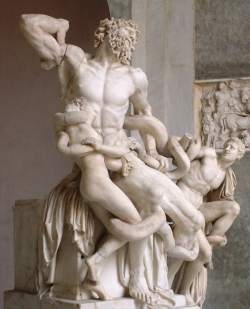
William Faulkner famously stated in the Wild Palms, "If I had to choose between pain and nothing, I would always choose pain." Funny, although I consider myself Buddhist, I have to admit that I would also choose pain. Perhaps this means I should reconsider my self-classification. For some reason we consider suffering noble. Goethe said he did not want anything to do with a religion that worships suffering and so he moved on to pantheism. Still, those things we are weaned with are so hard to reconfigure at a later time, and how can one not be awed by the sublime beauty of that tormented face on the crucifix or the visage of Laokoon just before he cries out as he and his sons are carried by the monster off to the sea.

 William Faulkner famously stated in the Wild Palms, "If I had to choose between pain and nothing, I would always choose pain." Funny, although I consider myself Buddhist, I have to admit that I would also choose pain. Perhaps this means I should reconsider my self-classification. For some reason we consider suffering noble. Goethe said he did not want anything to do with a religion that worships suffering and so he moved on to pantheism. Still, those things we are weaned with are so hard to reconfigure at a later time, and how can one not be awed by the sublime beauty of that tormented face on the crucifix or the visage of Laokoon just before he cries out as he and his sons are carried by the monster off to the sea.
William Faulkner famously stated in the Wild Palms, "If I had to choose between pain and nothing, I would always choose pain." Funny, although I consider myself Buddhist, I have to admit that I would also choose pain. Perhaps this means I should reconsider my self-classification. For some reason we consider suffering noble. Goethe said he did not want anything to do with a religion that worships suffering and so he moved on to pantheism. Still, those things we are weaned with are so hard to reconfigure at a later time, and how can one not be awed by the sublime beauty of that tormented face on the crucifix or the visage of Laokoon just before he cries out as he and his sons are carried by the monster off to the sea.


6 Comments:
beautiful imagery. I'd go for nothingess.
beautiful imagery. I'd go for nothingness.
I have felt nothing in my life and it is much more horrible that feeling pain or anguish (I am referring to mental rather than physical pain--I'm sure that there are physical pains that are too much to bear)--because I am still feeling and that means I am still thinking and may still act to change ...
Dear one, you are being perfectly present in choosing pain; choosing nothing over pain would be the least Buddhist choice. It is most definitely a gift and a wisdom to choose thusly.
It is an intriguing idea that choosing pain is being perfectly present, but it seems to me that all religion's recognize the suffering in the world, but that the Buddha's goal is to reduce this pain and suffering. To me it seems that Judaeism and Christianity to some extent glorify the value of suffering in terms of Job, Jesus on the Cross, etc and perhaps one might say that Buddhism has an element in this by praising the Bodhisattvas who after enlightenment return to help others and thus take on the pain themselves, but still the primary image for Buddhism (as far as I understand it) is the Buddha at peace and not an ireful Moses, a Christ in agony or an angry Father. I will meditate on this.
You are absolutely right that so much of Judeo-Christian tradition does give much import to the idea of pain. Being a descendent of Grunewald, it is probably in my cells---that would explain so much, wouldn't it?
But so much of Judeo-Christian suffering is of the nature of the put-upon: only Jesus himself suffered willingly, and only after some serious trepidation.
Gautauma made the choice of pain the moment he walked out of the palace walls, never to return.
It took some time for him to get the fit of the thing; and then, he of course, was the Buddha.
So as I see it, the nature of the choice is a paradox, the baroque and the mimimal, to say to oneself, I will choose "A," when clearly, "Z" is what is most desired and fitting.
If you see in yourself so often the dung beetle, I see I am sometimes the water strider, making use of the surface tension.
Post a Comment
<< Home